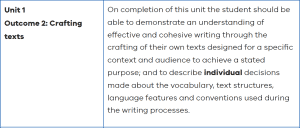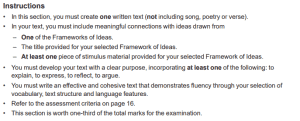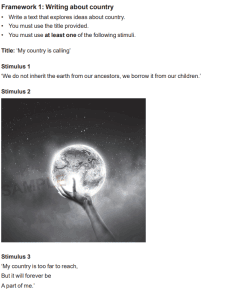Confused by the new ‘Creative Text’ component? Unsure what the ‘Framework of Ideas’ is?
Today we’ll provide as much detail as possible to make you more familiar with the new section and what it requires you to do!
In 2024 the Framework of Ideas and Crafting texts section was added to the VCE English Study Design, replacing the comparative essay and adding to the creative task component. The new section is quite intimidating due to its open-ended nature and how it leaves a majority of the work up to your creative direction.
Read on to find out more!
What is the Framework of Ideas?
Will I be assessed on the Framework of Ideas?
What does Framework of Ideas look like in the VCE English Exam?
What are the four options within the Framework of Ideas?
Audience and Context
Purpose
Reflective Commentary
How can I study and prepare for this section?
What is the Framework of Ideas?
The Framework of Ideas gives students four themes to explore in creative writing. In 1/2 English, your school and teachers are free to select the Framework of ideas and the texts they will use for Unit 1, Outcome 2. In 3/4 English VCAA provides these four themes to pick from:
- Writing about country
- Writing about protest
- Writing about personal journeys
- Writing about play
The four themes will not change, meaning you can investigate one in depth throughout the year. Schools and teachers must select for their classrooms, one of the Framework of Ideas, they must also select three of the four texts aligned with their selected Framework of Ideas provided by VCAA.
Please note that you cannot do the same Framework of Ideas and Mentor Texts in 1/2 and 3/4 English!
What are Mentor Texts and how do they relate to the Framework of Ideas?
Each framework aligns with four ‘Mentor Texts‘ provided by VCAA. The purpose of these texts are as follows:
- Explore effective and cohesive writing
- Explore the purpose, context and audience of texts
- Explore the intention and integrity of texts
- Explore the frameworks
- Unpack text structures, language features and vocabulary
Additionally, in 1/2 English, your teachers will provide you with their own chosen ‘Mentor Texts’ that related to the frameworks they made. You will not use the same ‘Mentor Texts’ in 1/2 and 3/4 English, VCAA very clearly requests that there must be no overlap.
Will I be assessed on the Framework of Ideas?
In VCE English, the framework of ideas are part of the Creating texts Area of Study. You will apply your exploration of the chosen framework to develop a creative piece.
These pieces can be in a variety of forms, such as poems, articles and short stories. Therefore, you will be assessed on your skills in writing a creative piece.
In 1/2 English this is how you will be tested on your creating text skills:
– Extracted from the official VCAA Website in the ‘planning’ section
In 3/4 English you will be tested on your creating text skills through the following:
– Extracted from the official VCAA Website in the ‘planning’ section
Furthermore, don’t forget that there will be a ‘Framework of Ideas’ (Crafting text) section in your final exam!!
Above is an extract from VCAA’s Sample VCE English Examination for the new English Study Design. These instructions outline what you are expected to write about in the ‘Framework of Ideas’ section. The key points of assessment are as follows:
- You must create meaningful connections with one of the themes, the title provided and one of the stimulus material.
- You must either explain, express, reflect or argue in your piece.
- You must display a high level of grammatical skill and expression.
Below is also the marking criteria for the Creative text section from VCAA’s Sample VCE English Examination. These criteria should provide you with a better idea of what you need to achieve in the exam!
What does the Framework of Ideas look like in the VCE English Exam?
Below is another extract from VCAA’s sample VCE English examination. This provides an example of what content you will need to use in order to write your creative piece.
Overall, there are three key parts in this extract:
- The framework
- The title
- The stimuli
You will be provided with the four different frameworks, all with different titles and stimuli in your exam.
What are the four options within the Framework of Ideas?
Confused by what the ideas actually mean? Let’s go through each one and unpack what they are about!
Writing about Country
Country relates to place and belonging. To be more specific, the framework explores physical land on different regional scales, emotional connections, memories and issues of these places. VCAA encourages students to investigate different cultural connections and people that are associated with this idea.
Key texts provided by VCAA :
- ‘Gooseberries’ – Anton Chekhov
- ‘The Hate Race’, Chapter 2 – Maxine Beneba Clarke
- ‘The Conquest of Land and Deam’ – Yumna Kassab
- ‘Split’ from ‘Flock: First Nations Stories Then and Now’ – Cassie Lynch
Writing about Protest
VCAA recommends to write about what protesting means, its value, potential outcomes and how it relates to conflict. You can explore established social activists such as Martin Luther King Jr and Rosa Parks as well as group protests like BLM. You could also look at protests throughout history, investigating their success or failure.
Key texts provided by VCAA:
- ‘Friday Essay: On the Sydney Mardi Gras March of 1978’ – Mark Gillespie, from The Conversation
- ‘Freedom or Death’ – Emmeline Pankhurst, from The Guardian: ‘Great Speeches of the 20th Century’
- ‘Monologue from City of Gold’ – Meyne Wyatt, Australian Broadcasting Corporation, Q+A episode
- ‘Harrison Bergeron’ – Kurt Vonnegut, Welcome to the Monkey House
Writing about Personal Journeys
You will create biographical style pieces and adventure through the journey of life. You have the freedom to tell a wide range of stories that have occurred throughout history or simply about yourself, you can even retell stories from different perspectives or viewpoints.
Key texts provided by VCAA:
- ‘The Danger of a Single Story’ – Chimamanda Ngozi Adichie
- The Red Plastic Chair is a Vietnamese Cultural Institution, and My Anchor’ – Amy Duong
- ‘bidngen’ – Maya Hodge
- Walter’s speech (end of Part 1) from The Inheritance – Matthew López
Writing about Play
You can explore the culture, history and tradition of performance. It can be play in any type of entertainment medium that is appropriate. VCE invites writers to explore how plays are used to make comments or propose ideas on real world events and issues.
Key texts provided by VCAA:
- Monologue from Cyrano – Virginia Gay
- ‘All That We Know of Dreaming’, Something Special, Something Rare: Outstanding Short Stories by Australian Women. – Penni Russon
- ‘About the Boys’ – Tim Winton
- ‘An Open Letter to Doubting Thomas’ – Chelsea Roffey
Audience and Context
In the VCE English Study Design, it outlines that “audience and context are key to creating effective and cohesive writing”. Therefore, it is important for you to understand how to address audience and context when writing the creative piece. VCAA provides some points for you to consider when trying to implement these two components into your piece:
– Extracted from VCAA’s VCE English Study Design
Generally, achieving appropriate consideration for audience and context will come with practice and study, as it will require a deep understanding and knowledge of your chosen framework. Over time, as you continue to write on your framework, you’ll become more familiar with these two concepts and how they relate to your piece!
Purpose
You will need to consider the reasons for creating the text. VCAA provides you with four purposes that you can use when writing your piece:
- Express: exploring stories and narratives.
- Explain: exploring cause, effect and consequence.
- Reflect: exploring personal revelation.
- Argue: explore a point of view, taking a position and suggesting answers to issues.
Reflective Commentary
The reflective commentary applies specifically to coursework (your SACs). The purpose of the reflective commentary is to make students justify why they took their creative piece in the direction they did by explaining their writing process.
Specifically, the task may involve:
- Why you interpreted the framework the way you did
- Why you utilised your mentor texts the way you did
- Why you used your chosen form
How can I study and prepare for the Framework of Ideas?
Firstly, the ‘Mentor Texts’ are extremely important, I highly recommended for you to have deep knowledge and understanding of these texts and to really think about how they link to your chosen Framework of Ideas. I would personally create extensive notes and annotations on all my mentor texts and additional pieces.
Secondly, I would practice crafting texts under the proper SAC and exam conditions, with the same material, help, and timing. This will help you feel more familiar with the task and ultimately more prepared.
Finally, make sure to pick (if you do have the ability to choose) a framework that you are extremely passionate or knowledgeable about! You can always write more on something you are passionate about. There is no ‘easier’ or ‘harder’ framework.
It is important to note that you are not allowed to write a song, poetry or verse in the final exam!
That’s all!
Although this section may be intimidating due to how open-ended it is, VCAA has set out a very clear set of guidelines that outline what they want you to achieve in your piece. Make sure to keep the criteria in mind when preparing for this section!
For the most part, I’m sure if you practice enough and do plenty of exploration into your respective framework of ideas, you’ll be able to handle this section of VCE English with ease!
Have multiple SACs on at the moment? Read our guide on managing many SACs at once!
Are you looking for some extra help with working through the VCE English Study Design?
We have an incredible team of VCE tutors and mentors!
We offer specialised English tutoring in Melbourne with expert tutors! Get in contact today to secure your expert coach.
We can help you ace your VCE English SACs and ace your upcoming VCE assessments with personalised lessons conducted one-on-one in your home or online!
Looking for a local tutor in Footscray? Or needing support for the VCE in Doncaster? We offer one-on-one tutoring, in your home or online!
We’ve supported over 8,000 students over the last 11 years, and on average our students score mark improvements of over 20%!
To find out more and get started with an inspirational VCE tutor and mentor, get in touch today or give us a ring on 1300 267 888!
Max Huyton is the VIC Growth Marketer for Art of Smart and a Laws and Commerce student at Monash University. In his other life, Max spends his time reading and writing whenever he gets the chance and cooking extremely mediocre dishes for friends and family.










